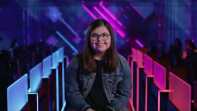Annual Report

Read the Letter from Mary Davis, CEO and Tim Shriver, Chairman:
We're back, baby. Back in a big way. Last year the world started turning again, away from the pandemic shadows and into the light and Special Olympics athletes were at the center of the action. We’re back!
We're back, baby. Back in a big way. Last year the world started turning again, away from the pandemic shadows and into the light and Special Olympics athletes were at the center of the action. We’re back!
A Letter from an Athlete:
In Special Olympics, I’ve found my family and discovered my strength.
—Qiang Xudong, Special Olympics China athlete since age 11
In Special Olympics, I’ve found my family and discovered my strength.
—Qiang Xudong, Special Olympics China athlete since age 11
The Reach Report is a summary of key programmatic results achieved globally in the framework of its activities conducted in the previous year.
Unbeatable Together: Special Olympics World Games Berlin 2023
2023 marked a momentous year, as the Special Olympics movement’s flagship event—the World Games—were held for the first time in four years. The 2023 Special Olympics World Games took place from 17 – 25 June in Berlin, Germany, welcoming nearly 7,000 athletes and Unified teammates (athletes without intellectual disabilities) from 176 nations. These World Games boasted record-breaking numbers and several notable firsts.

4.2 Million Athletes and Unified Partners

53,779 Competitions in 2023

Unified Leadership grew by 29% in 2023

Healthy Athletes Screenings grew by 74% in 2023
Sports
Sport development highlights include – the coach webinar series made its third installment this year with the highest recorded attendance ever. The MATP program was awarded 13 development grants that were delivered to national programs. As of 2023, Special Olympics has over 1,083 international, regional, and national level sport federation partnerships. These relationships allow us to focus on the expansion of local sport programming. Sport continues to grow so that our athletes can gain more skills and confidence on and off the field.
Sport and Competition
2023 marked a momentous year, as the Special Olympics movement’s flagship event – the World Games – were held for the first time in four years. The 2023 Special Olympics World Games took place from 17–25 June in Berlin, Germany, welcoming 6,500 athletes and Unified teammates (athletes without intellectual disabilities) from 176 nations.
Inclusive Health
A vision for inclusive health everywhere. Our athletes are making their voices—and their vision of health equity—heard. Special Olympics health is creating a world where people with intellectual disabilities have every opportunity to be healthy. To date, Special Olympics has performed over 2 million free health screenings, including 93,928 in 2023. The World Games in Berlin served as a fitting backdrop for the 2023 Global Golisano Health Leadership Awards event. This event honored the remarkable work of seven individuals and organizations from across the globe that have served as champions of inclusive health in their countries, actively improving access to quality services for people with intellectual and developmental disabilities.
Youth and Schools
A banner year for inclusive education. Unified Champion Schools programming has extended its reach beyond the United States to 151 countries in. In 2023, UCS received the esteemed Academy Choice Award from HundrED, a global leader in education innovation. The Global Youth Leadership Summit marked a historic milestone for youth leaders from across the world. Special Olympics Global Center for Inclusion has launched a global Research Collaborative, comprised of 33 global scholars and athletes.
Leadership
In 2023, Special Olympics hosted seven Unified Leadership sessions for more than 275 people at 65 different companies and organizations. The 2023 World Games in Berlin was the perfect platform for athlete leaders from all over the world to shine: showing their talents and skills beyond the playing field, plus representing fellow athlete leaders as spokespeople and decision-makers throughout the Games. The 2023 Global Athlete Congress successfully achieved its objective of further developing athletes’ leadership skills, so they can take on more leadership roles in Special Olympics, their communities, and the workplace.
Corporate Partners 2023 Highlights
Campaigns, activations, and ads that our corporate partners supported throughout 2023.
Special Olympics World Games Berlin 2023 Teaser: Breaking Down Walls
ESPN/ABC's teaser is guaranteed to get you pumped for Special Olympics World Games Berlin 2023!

“Every time I speak up in group discussions and share my thoughts, I receive encouraging applause. In Special Olympics, I’ve found my family and discovered my strength.”
Qiang Xudong, Special Olympics China athlete since age 11






















